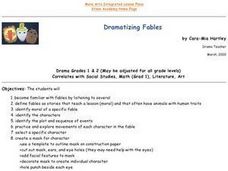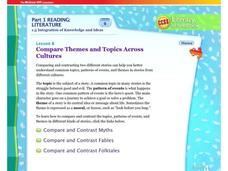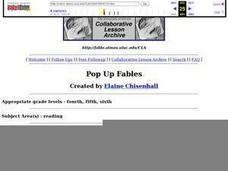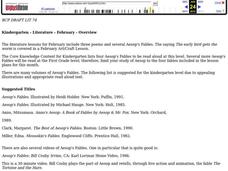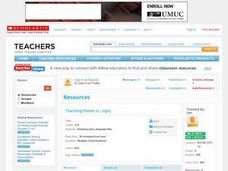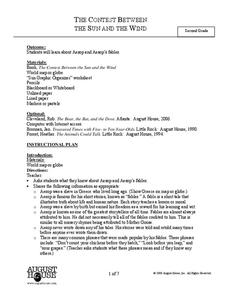Asian Art Museum
Telling Tales with Kamishibai
Kamishibai (paper drama), is a Japanese form of storytelling that uses emakimono (paper picture scrolls), to relay a moral lesson. As part of a series of resources that examine Japanese art and artists, learners watch a video...
Curated OER
Helpful Animals and Compassionate Humans in Folklore
Students define elements of stories from around the world that include helpful animals. They explore animal character motivations and use graphic organizers to compare and contrast animal stories from different cultures.
Read Works
The Boy Who Cried Wolf
Reinforce reading comprehension strategies and contemplate an important life lesson with a learning exercise featuring Aesop's fable, The Boy Who Cried Wolf. After reading a brief passage, scholars show what they know by...
Curated OER
Greek Culture And Aesop's Fables
Pupils investigate Aesop's Fables and how they influenced the culture of Ancient Greece. They research five different fables and reflect upon the morals of the stories and state how they influenced the practices of the Greek in writing.
Curated OER
The Hare and the Tortoise
Here is a simple re-telling of the classic fable, "The Tortoise and the Hare." Learners are either read to, or they read along, as each slide progresses through the tale. The moral of the story is present as well; slow and steady wins...
Curated OER
Aesop’s Fables Comparison Worksheet
In this Aesop's Fables comparison activity, students list the name of the fable, its characters, a story summary, and the moral of the story. They compare 6 fables.
Curated OER
Dramatizing Fables
Students familiarize themselves with fables by listening to several of them. They define fables. They identify the moral of a specific fable. They identify characters, plot and sequence of events. They create a mask of a character in a...
K5 Learning
Androclus and the Lion
Kindness is never a standalone act. Fourth graders read the classic tale of Androclus and his act of service to the lion, which is repaid to him by the lion in a Roman colosseum. After reading the passage, they answer four comprehension...
K5 Learning
The Coat
The moral of the story: listen to your parents! A concise reading passage introduces learners to Tom and the consequences of his choice to go out without a coat.
Curated OER
Understanding Theme With Fables
In this theme worksheet, students read a set of short fables, determine theme and write their explanations below each.
Curated OER
All About Aesop
First graders explore the genre of fables. In this fables lesson, 1st graders use various reading strategies to raise comprehension skills. Students make prediction and complete a prediction journal. Students understand that fables have...
McGraw Hill
Compare Themes and Topics Across Cultures
Compare and contrast folktales, myths, and fables in an interactive eBook. The interactive is broken up into three topics: myths, fables, and folktales. Each section includes a reading passage and a guided lesson on the theme, topic, and...
Curated OER
Drama: Learn A Lesson from the Lion
Reading is reading, whether it's for drama or English class. Boost reading fluency, accuracy, intonation, and comprehension while fostering creative acting skills. Kids read the provided tale of "The Lion and the Mouse" several times in...
Curated OER
The Fable of Franny And Her Fabulous Fainting Goat
Mix the art of reading comprehension with the skill of telling time. Children in grades two and three will discuss the importance of goats throughout history based on the provided background information. They'll create cute goat...
Curated OER
Pop Up Fables
Students read a fable and create a pop-up book of the fable. Students add the moral of the story to the back of the book.
Curated OER
Fables
In this fables worksheet, students learn about the different parts of a fable. They learn how to retell a story, analyze the characters, identify the moral and dramatize the story.
Curated OER
Fables With Dolch Sight Words
Second graders read classic fables, consider their meaning and then re-write them using a prompt if necessary. This lesson plan presents many classic fables that students can read, and re-write, using their powers of imagination.
Curated OER
Aesop's Fables
Students read a fable about a lion and a mouse. They discuss the differences between the two animals. As a class, they discover the lesson of the story. Then they make puppets and reenact the fable.
Overcoming Obstacles
Cooperation and Teamwork
One of Aesop's fables begins with a lesson plan about cooperation and teamwork. Scholars listen carefully, taking note of the moral of the story. The class discusses their findings and why working with others makes work easier. Learners...
Curated OER
Slow and Steady Wins the Race
Students are introduced to the characteristics of fables. They read a fable by Aesop. In small groups, students identify fable characteristics present in Aesop's story and share their observations with the class.
Curated OER
Joseph Had a Little Overcoat Lesson Plan
Young scholars discuss various features of a book, aspects of the story, and then engage in a retelling of the story. In this early childhood lesson plan, students identify the author, illustrator, and title of a book, Joseph Had a...
Curated OER
Theme vs. Topic
Middle schoolers use Aesop's fables to examine theme and topic. In this theme and topic lesson, students read different fables and discussing as a class. After hearing more stories middle schoolers work in pairs to determine the...
Curated OER
Storytelling
Students explore the origins of folktales, fairytales, myths, legends, fables, and folktales in the ten lessons of this unit. A storytelling festival is held to feature the results of the variety of activities presented in the unit.
Curated OER
The Contest Between The Sun And The Wind
Second graders read fables by Aesop and learn about the famous storyteller. For this fables lesson plan, 2nd graders discuss questions about Aesop and then write their own fable.








